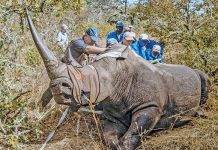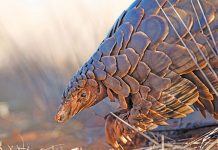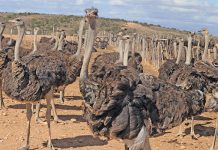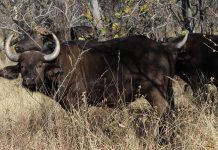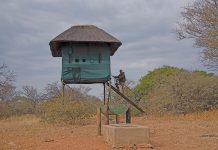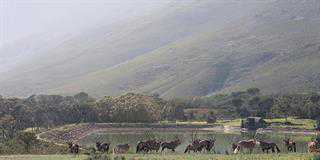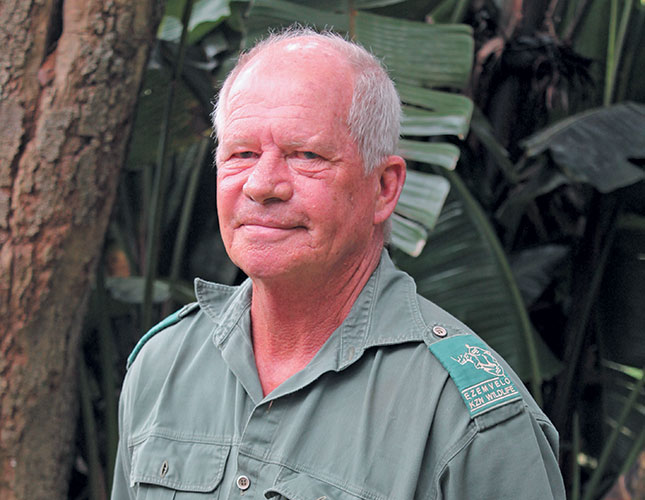
How long have you been a wildlife veterinarian, and what does your job typically entail?
I began working for the then KwaZulu-Natal Parks Board, now Ezemvelo KZN Wildlife, in 1995. For many years, my job involved ensuring the welfare of animals that were captured and translocated to other conservation areas. At the same time, I conducted disease surveillance and control in game populations within KZN Wildlife’s protected areas. I also had to treat animals that were caught in poachers’ snares.
However, over time my work priorities have changed, mostly due to rhino poaching. Whereas I used to conduct only two or three forensic post-mortems a year on poached rhino, since about five years ago this has rapidly escalated and I now spend about a third of the year conducting forensic post-mortems on poached rhino and treating rhino wounded by poachers.
Also taking up much of my time nowadays is the insertion of tracking devices into live rhino for security purposes, dehorning live rhino as a deterrent to poachers, and strategic translocations of rhino out of high-threat areas.
When a rhino has been killed or wounded in a poaching incident, how are you required to respond?
My primary role is to collect any physical evidence related to the death or wounding of the animal. This mostly involves collecting the bullets that may have led to its death or injury. This evidence is then handed over to the police to be used in follow-up investigations.
I’m also tasked with determining the cause of each rhino’s death, which may not necessarily be a result of a poacher’s bullet. If a rhino poaching case does eventually get to court, which, unfortunately, does not happen often enough, the evidence presented against the suspects must be reliable, and must have been collected by a credible witness such as the attending veterinarian.
What are some of the most difficult experiences that you’ve had when attending rhino poaching scenes?
With relatively fresh rhino carcasses, it’s often easier to determine the circumstances of their deaths than with decomposing carcasses that have been fed on by scavengers. So many times I get to a rhino carcass, only to realise that the animal was still alive while the poachers were hacking its horns.
I actually can’t begin to describe just how brutal the treatment is that many of these wounded rhino have received at the hands of poachers.
Sometimes a rhino is paralysed by a poacher’s bullet to the spine, and then bludgeoned to death. At other times, the rhino has been shot and wounded, but has managed to escape temporarily until the poachers track it down, or until it bleeds to death, and you realise the enormous pain and suffering the animal must have gone through before it eventually died.
The poachers often won’t bother shooting a wounded rhino again to kill it, either because they don’t want to spend another bullet, or because they’re concerned that another gunshot will give away their location. To sufficiently immobilise a wounded rhino long enough to remove its horns, poachers use heavy, long-handled axes to sever the animal’s spine, or they cut its Achilles tendons.
Do you and your colleagues come across rhino calves that have been orphaned by poachers?
Poachers are not interested in young rhino that don’t have horns worth taking. The calf will want to stay with, and even try to protect, its dead or wounded mother while the poachers are hacking her horns. If the calf keeps interfering, the poachers generally beat it off.
Many of the live orphans that we find have been battered or hacked and left with open wounds. Fortunately, we sometimes find an orphan close to its mother and we can catch it, treat it and send it to a capture boma for feeding and other care. At other times, we get an indication, perhaps due to its spoor, of an orphan that has been chased into the bush.
It’s more difficult for us to find these to attend to them. If they’re younger than a year old and we can’t find them in time, they’ll die of dehydration or from being preyed on by larger predators. A large percentage of rhino orphans are not found and this means the poachers not only killed its mother, but also directly or indirectly contributed to her calf’s death.
How does seeing and experiencing these situations affect you?
It’s extremely hard to have to face the same brutality time after time. I often wish I could avoid having to reconstruct how each rhino died and having it replay
in my mind. I try to distance myself emotionally from each incident, and try not to think too much about it. It’s a defence mechanism that I’ve had to build over time. But there are also cases where we find rhino severely wounded, but still alive.
They’ve often been in this terrible state for days before we discover them. If one of them is beyond my help, I’m often called on to euthanise it, which is also a traumatising task. These kinds of experiences can really affect a person psychologically.
And I find that it also starts to impact on my effectiveness in carrying out other important jobs related to the promotion and implementation of biodiversity conservation.
What are the manifestations in your personal life of what you’ve seen and experienced in the aftermath of so many rhino poaching incidents?
Any vet will tell you that at various times he or she will be exposed to cases of horrific cruelty to animals. Sadly, it’s part of our job. But when it happens on an infrequent basis, which is what I was used to before the rhino poaching onslaught began, a vet can deal with these animal cruelty cases a lot better.
In my case, I’ve found that dealing with this cruelty on an almost weekly basis is now getting to me. I’m increasingly struggling to deal with it. I try to put up psychological defences to protect myself, but it’s becoming impossible for these defences to remain effective with case after case. A person’s subconscious doesn’t forget the terrible things that it experiences.
My wife, Debbie, has noticed that I’m mumbling, and tossing and turning in my sleep. What I’ve noticed is that my emotions are very close to the surface nowadays. For example, I can be telling Debbie or my father, Tim, about my rhino poaching work and I’ll suddenly burst into tears. I think that I’ve shed more tears in the past five years than in all the years of my life combined.
How are your colleagues affected by these incidents?
Most of the people I work with have a passion for wildlife conservation and cannot walk away from these scenes without being negatively affected. I play the veterinary role, but the public must never lose sight of those responsible for conservation and law-enforcement.
These people are out in the bush almost every night, trying to prevent rhino poaching and catch poachers. And when they lose a rhino despite their efforts, they take it very personally. Unfortunately, the night belongs to poachers and this puts anti-poaching officers at a significant disadvantage. It doesn’t help that many government conservation organisations are cash-strapped and can’t afford to pay for more boots on the ground, which is essential for improved anti-poaching efforts.
I’ve seen how this despairing situation negatively affects both old and young section rangers. They’re often at the end of their tethers. I’ve seen highly experienced conservationists burst into tears.
It has got to the point where I’m now struggling to handle the emotions displayed by these people whom I admire, and I sometimes have to try and help them deal with the trauma that they’re experiencing because of rhino poaching. Some of these rugged men simply cannot handle being called on yet again to euthanise another badly wounded rhino.
How do you cope with the trauma?
It’s essential that everyone involved in dealing with cases of poached rhino has some form of support mechanism in place. I’m blessed to have an incredibly supportive wife. You need someone to whom you’re not afraid to show your emotions, or with whom you are able to talk about your emotions. I’ve found this really helps me.
There’s also nothing shameful about going to see a clinical psychologist to help you deal with post-traumatic stress disorder.
It’s essential that people learn to admit they have problems, so they can find ways to deal with them. Not dealing with this kind of trauma could lead to impaired judgement that, especially if they’re carrying firearms, could result in unfortunate incidents with serious consequences.
For example, I often wish I was 20 years younger so that I could be running around the bush trying to catch rhino poachers, instead of having to clean up after them. Sometimes, I get so frustrated and angry that I just want to grab a weapon and go out there to give the poachers payback.
I want to feel that I’m doing even more than I’m doing currently to try to catch them. But I’m aware of these feelings and impulses, and know that I should avoid situations where they could potentially get out of control.
Having spoken to experts in post-traumatic stress disorder, I’ve also learnt coping mechanisms that help me to deal with my feelings.
What do you believe is needed to significantly reduce or eradicate rhino poaching?
There are several solutions, but the process must start from the bottom. Anti-rhino poaching efforts need many more people and resources on the ground.
The most advanced technologies available, such as night-sight and other surveillance and tracking equipment, are also needed.
The investigative process, all the way to the judicial system, needs to be as efficient and effective as possible. Harsh bail conditions and prison sentences should also be imposed to serve as a deterrent to other poachers.
Furthermore, the demand for rhino horn must be reduced through education. I also think that rhino horn trading should be legalised on a trial basis, although this would need to be strictly regulated and managed to minimise the system being abused by corrupt officials and other people.
Rhino will always need protecting, but if public and private rhino owners were able to generate some income from their animals through, for example, the legal sale of horns, this money could be reinvested in the protection of these animals.
At the moment, private rhino owners are disinvesting in their rhino enterprises because it’s no longer financially viable to protect them. And private rhino owners are needed because they make a major contribution to conserving the species.
How do you and your work colleagues respond to the news that supposedly trustworthy individuals, such as other wildlife vets, conservationists, police officers and government officials, amongst others, are implicated in rhino poaching and rhino horn smuggling?
It’s the ultimate betrayal and hits us very hard. Anger is the first emotion that comes to the surface. It’s very hard to deal with the arrests of people that you know, trusted, and often worked with against rhino poaching. Their actions amount to treason against their colleagues and against the state.
Unfortunately, rhino horn has become one of the most valuable commodities in the world. And as soon as something has such a high financial value, there are going to be people who want to take advantage of it for their own personal benefit. It’s human nature and I’m actually not surprised by it.
Email Dr Dave Cooper at [email protected], or visit kznwildlife.com for more information.

